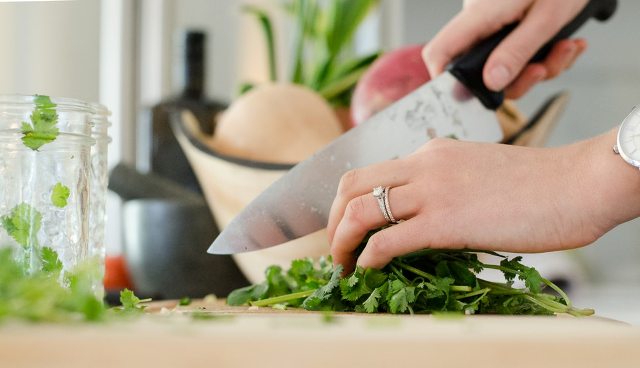
Occasionally buying lunch and ordering take out a few nights a week is convenient, especially when you live alone. It can drain your wallet to the tune of thousands of dollars a year, too.
People report a lack of cooking skills and less time to prepare meals as the main reason for not cooking. Eating at restaurants and ordering take out might seem easier.
We're going to show you an easier way. We've got seven great tips on cooking for yourself that are going to save you time and money.
Start dreaming about what you're going to do with all that extra cash now!
1. Shop Smart
Learning how to shop for food is step one in learning how to cook for yourself. There's a strategy involved.
Here's how you can conquer the grocery store:
- Make a food budget -- Figure out how much you want to spend and stick to it
- Look for sales -- Check out circulars, coupons, and offers and shop around the sales
- Never shop hungry -- It helps keep impulse buys to a minimum
- Know before you go -- Make a map of the grocery store and don't stray from the path
2. Take Shortcuts
Having fresh produce on hand all the time can be expensive. If you don't use it before it goes bad, then that's money down the drain.
You can eat healthy and save cash by embracing frozen and canned foods. More often than not, they're just as good as fresh but with a much longer shelf life.
When opening a bag of frozen food, take just what you need and save the rest for later. Canned foods are incredibly versatile and easy to use, costing sometimes mere pennies.
3. Figure out Your Cooking Style
The biggest challenge of being a home chef for one is cooking too much. There are different cooking styles that help with this problem.
Carry-Over Ingredient
With this cooking style, you have one ingredient that carries over to the next meal.
Let's say you make chicken and pasta one night. Make extra pasta for the next night, maybe using it for a soup or a cold pasta salad.
One and Done
Make a huge meal at the beginning of the week and then keep eating it all week long. You might get bored with this technique, but you'll always be fed.
Multipurpose Ingredient
With this technique, you make a huge batch of one ingredient and make a new meal with it every night. A big batch of ground beef stretches the entire week as taco soup, pasta sauce, etc.
Try one style of cooking or all of them to find the one that works best for you.
4. Keep it Spicy
The best way to get the most bang for your buck, food-wise? Have a well-stocked pantry.
It's easy to get bored with the same old, same old. Adding a new spice or condiment keep things interesting.
This works great for any kind of cuisine from tried and true staples to vegan meals to more adventurous fare from around the world.
Some additives are both tasty and have added health benefits. Something like hemp oil can be a great benefit in the kitchen.
5. Be Cool
No matter what, eventually you'll either get bored with leftovers or have too much. That's OK, it happens.
Instead of throwing it out, store leftovers in the freezer so that you always have a go-to meal. Soups and stews are perfect for this and usually taste better after a stint in the fridge.
6. Do the Math
Remember those math problems you used to do in high school? The one where Jane has 600 bananas and needs to make 200 loaves of bread?
They come in handy when you're cooking for one. Doing a little math will cut down waste and keep portions manageable.
Figure out how to cut recipes in half so you don't have tons of leftovers. Some recipe websites even have converters built in.
To start with, you might not even have to do the math. You can buy smaller portions of food so that less spoils and goes to waste.
For example, don't buy a gallon of milk. See if the corner store has a smaller jug that you'll use before it expires.
While this strategy might cost more because of convenience sizes, it's better than having the food go bad.
7. Eat in Order
Speaking of food going bad, there are things you can do to minimize that as well. You can eat your food in a certain order so that it lasts longer.
For example, eat food that spoils fast first. Spinach, which wilts quickly, lasts longer than potatoes.
If you did buy a whole gallon of milk and it's getting close to the expiration date, try repurposing it. Use it to make ricotta cheese, kefir, or yogurt before it goes bad.
Bread going stale? Turn it into Panzanella, grind it into breadcrumbs, or season or toast them to make croutons.
Once you get creative, you'll be able to stretch your food -- and your budget -- in many different ways!
Bonus Tips
These seven tips will get you started, but here are a few other ideas to keep in the back of your mind:
- Shop in bulk for grains and beans
- Join a co-op or food subscription service to get discounted fresh veggies
- Start a garden in your backyard or on your terrace
- Buy a canning kit and learn how to make your own preserves
Cooking for Yourself Is Easy!
It takes a little bit of work but cooking for yourself can be rewarding -- especially for your bank account. Think of it as a new hobby and have fun with it!
Ready to roll your sleeves up and get into the kitchen? Check out all of these delicious, healthy, and frugal recipes to get inspired!
